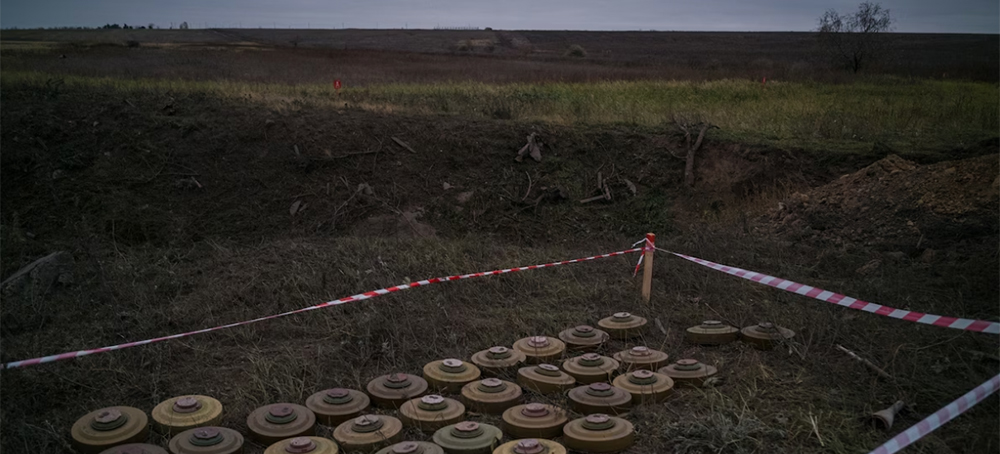Live on the homepage now!
Reader Supported News
Our coverage of Russia’s war on Ukraine is the exact type of war we have always opposed. One of imperial aggression, generating massive war crimes against innocent civilians. What we see happening in Ukraine today is precisely the reason war should always be opposed.
The difference now is that we have taken a position in support of arming Ukrainians to defend their land and their people. While that would appear to break the cardinal rule that all use of military force is bad, the circumstances in Ukraine we believe demand it.
The term war crimes tends to lose its meaning when repeated frequently. The question arises, isn’t everything that happens in a war a crime? A certain dulling of the senses can set in. For clarity what is taking place in Ukraine at the hands of Russian invaders are the most serious war crimes committed certainly since the U.S. Carpet Bombing of Cambodia in the late 1960s and early 1970s and arguably since genocidal purges of Adolph Hitler’s Nazi forces during World War II.
Specifically the crimes being committed by Putin’s forces in Ukraine include, mass detention and summary execution of civilians, deliberate targeting of civilian infrastructure with weapons of war, rape as a weapon of war, child abduction and deportation and a plethora of related acts expressly prohibited under international law.
RSN in solidarity with every human rights organization in the world condemns these acts as illegal under international law and something that must be opposed through all lawful means. These are the worst human rights violations our organization has ever covered. We stand opposed.
Our readership has traditionally been comprised largely of Western Progressives. Western Progressives seem uniquely receptive to the Putin regime’s rhetorical assertions. Most notably that the US provoked the Russian invasion of Ukraine. That argument fails on every level and would fail in any fair court on earth. Russia and Russia alone is categorically responsible for the crimes it is committing in Ukraine.
While we certainly feel and have always felt a sense of solidarity with our Progressive readership we cannot, we will not remain silent in the face of massive atrocities against innocent civilians. RSN at its core is a human rights organization, that is our most important mission.
During the course of this conflict RSN has lost the support of some readers and gained the support of others. For those who understand the urgency of this moment and the importance of the stand we are taking in this time of crisis we ask for your support. We will absolutely need it to continue our work.
Marc Ash is the founder and former Executive Director of Truthout, and is now founder and Editor of Reader Supported News.
Reader Supported News is the Publication of Origin for this work. Permission to republish is freely granted with credit and a link back to Reader Supported News.
READ MORE  Mines and unexploded rockets next to a destroyed bridge on the way to Kherson, Ukraine, in November. (photo: Wojciech Grzedzinski/WP)
Mines and unexploded rockets next to a destroyed bridge on the way to Kherson, Ukraine, in November. (photo: Wojciech Grzedzinski/WP)
The transformation of Ukraine’s heartland into patches of wasteland riddled with danger is a long-term calamity on a scale that ordnance experts say has rarely been seen, and that could take hundreds of years and billions of dollars to undo.
Efforts to clear the hazards, known as unexploded ordnance, along with those to measure the full extent of the problem, can only proceed so far given that the conflict is still underway. But data collected by Ukraine’s government and independent humanitarian mine clearance groups tells a stark story.
“The sheer quantity of ordnance in Ukraine is just unprecedented in the last 30 years. There’s nothing like it,” said Greg Crowther, the director of programs for the Mines Advisory Group, a British charity that works to clear mines and unexploded ordnance internationally.
Staggering scale
About 30 percent of Ukraine, more than 67,000 square miles, has been exposed to severe conflict and will require time-consuming, expensive and dangerous clearance operations, according to a recent report by GLOBSEC, a think tank based in Slovakia.
Though the ongoing combat renders precise surveys impossible, the scale and concentration of ordnance makes Ukraine’s contamination greater than that of other heavily mined countries such as Afghanistan and Syria.
HALO Trust, an international nonprofit that clears land mines, has tracked, using open-source information, more than 2,300 incidents in Ukraine in which ordnance requiring clearance was discovered. Though events are greatly underreported and the data does not include the results of on-the-ground surveys by HALO Trust or other organizations, it gives a harrowing outline of the problem.
This week’s deployment by Ukrainian forces of U.S.-made cluster munitions, which are known to scatter duds that fail to explode, can only add to the danger.
Human cost
The explosives have already taken a heavy toll. Between the start of Russia’s full-scale invasion in February 2022 and July 2023, the United Nations has recorded 298 civilian deaths from explosive remnants of war, 22 of them children, and 632 civilian injuries.
Civilian deminers, who clear unexploded ordnance and mines from liberated territories, are highly trained and use safety gear. But they are not immune from catastrophic accidents.
Vladislav Sokolov, a deminer for Ukraine’s emergency service, told The Washington Post that one of his friends, a fellow deminer, lost a leg while working in a Kramatorsk minefield in 2022. Sokolov and his friend reunited at a meeting of ordnance disposal professionals after he received a prosthetic.
He was “trying to learn to walk” again, Sokolov said.
Dmytro Mialkovskyi, a Ukrainian military surgeon, has been operating on mine injuries since the beginning of the war. On Friday, at a hospital in Ukraine’s Zaporizhzhia region, he had to make a gut-wrenching call to save the life of a mine blast patient who was dying of his injuries.
“I realized that this leg is killing him and there is another leg with a tourniquet, too,” Mialkovskyi said. “So I had to do a quick amputation of both legs. In 10 minutes.”
“I still don’t know if he’ll survive,” he said.
Hidden killers
Both sides use mines. Russia heavily mined its front lines in anticipation of Ukraine’s ongoing counteroffensive, and has made far more extensive use of widely banned antipersonnel mines.
Small, deadly antipersonnel mines, triggered by the weight of the human body, cannot discriminate between combatants and noncombatants.
Russian forces have used at least 13 types of antipersonnel mines, as well as victim-activated booby traps, Human Rights Watch investigations found. Evidence suggests Ukraine has also used at least one type of antipersonnel mine, a rocket-delivered PFM blast mine, around the Ukrainian city of Izyum in summer 2022.
Antitank mines, which usually require immense weight to detonate, are not internationally banned, though any explosive device that could be detonated unintentionally by a civilian can be considered an antipersonnel mine under the 1997 Mine Ban Treaty, to which Ukraine, but not Russia or the United States, is a party.
Both Russian and Ukrainian forces have used anti-vehicle mines.
The United States included two types of mines in its aid packages to Ukraine: the Remote Anti-Armor Mine System, which uses 155-milimeter artillery rounds to create temporary minefields programmed to self-destruct, and M21 antitank mines, which require hundreds of pounds of force to detonate but do not self-destruct, leading to concerns about later removal.
Mines are not the only type of explosive that pose a threat. Mortars, bombs, artillery shells, cluster munitions and others also become hazards if they do not explode when deployed.
Undoing the damage
Russia’s heavily mined defenses, built up over months of stalemate along the front lines, are slowing down the Ukrainian counteroffensive that began last month, damaging Western-supplied battle tanks and infantry fighting vehicles.
Though specialized mine-clearing vehicles are in use, front-line mines are so concentrated that specialized soldiers, called sappers, have had to resort to clearing paths by hand.
Humanitarian clearance operations, which return denied land to local populations after conflict, are extremely slow, tedious and expensive. They are underway across parts of Ukraine, including around Kyiv, the capital, and other areas West of the front lines, where the battle has receded.
Ukraine’s contaminated territory is so massive that some experts estimate humanitarian clearance would take the approximately 500 demining teams in current operation 757 years to complete.
Demining teams crawl inch by inch across the terrain, using metal detectors and sometimes explosive-sniffing dogs, excavating every signal, not knowing whether they will uncover a harmless nail or deadly mine.
GLOBSEC estimates that one deminer can only clear 49 to 82 square feet per day, depending on the terrain and concentration of explosives.
The short window for clearance in the spring, after the ground thaws and before farmers plant, leaves little room for disasters like the Kakhovka dam breach in early June, which drastically disrupted clearance efforts.
Farmers in heavily contaminated regions such as Kherson have resorted to visual inspections and rigging tractors with armored plates while planting this year’s harvest.
There is a steady market for “dark deminers,” who offer hasty and often unreliable clearance without official certification, to clear some of the more than 19,000 square miles of unusable agricultural land.
Demining is not just slow, it’s also expensive. The World Bank estimates that demining Ukraine, which costs between $2 and $8 per square meter, will cost $37.4 billion over the next 10 years.
The United States has committed more than $95 million to Ukraine’s demining, according to a 2023 State Department report.
How Ukraine compares
Mines as a dark legacy of conflict all over the world, from Cambodia to Kosovo, hint at the challenges Ukraine could face as it rebuilds.
Cambodia, riddled with millions of land mines after decades of conflict, has been subject to ongoing clearance operations for 30 years. Crowther estimates there at least five years of work remains. Tens of thousands of people have been maimed by Cambodia’s mines.
Kosovo saw armed conflict in 1998 and 1999. “Kosovo was a six-month war that was a fraction of the scale of this conflict,” Crowther said of the war in Ukraine. “It’s taken decades.”
READ MORE  Thousands of Israelis march along a highway toward Jerusalem in protest of plans by Prime Minister Benjamin Netanyahu's government to overhaul the judicial system, near Abu Gosh, Israel, on Saturday. (photo: Ohad Zwigenberg/AP)
Thousands of Israelis march along a highway toward Jerusalem in protest of plans by Prime Minister Benjamin Netanyahu's government to overhaul the judicial system, near Abu Gosh, Israel, on Saturday. (photo: Ohad Zwigenberg/AP)
Also Saturday, more than 100 of Israel's former security chiefs signed a letter pleading with the Israeli premier to halt the legislation, and thousands of additional military reservists said they would no longer report for duty, in a protest against the plan.
In scorching heat that reached 33 C (91 F), the procession into Jerusalem turned the city's main entrance into a sea of blue and white Israeli flags as marchers completed the last leg of a four-day, 70-kilometer (45-mile) trek from Tel Aviv to Israel's parliament.
The marchers, who grew from hundreds to thousands as the march progressed, were welcomed in Jerusalem by throngs of cheering protesters before they set up camp in rows of small white tents outside the Knesset, or parliament, before Monday's expected vote. Meanwhile, hundreds of thousands flooded the streets of the coastal city of Tel Aviv, the country's business and cultural capital, as well as in Beersheba, Haifa and Netanya.
Netanyahu and his far-right allies claim the overhaul is needed to curb what they say are the excessive powers of unelected judges. But their critics say the plan will destroy the country's system of checks and balances and put it on the path toward authoritarian rule.
U.S. President Joe Biden has urged Netanyahu to halt the plan and seek a broad consensus.
The proposed overhaul has drawn harsh criticism from business and medical leaders, and a fast-rising number of military reservists in key units have said they will stop reporting for duty if the plan passes, raising concern that the country's security interests could be threatened. An additional 10,000 reservists announced they were suspending duty on Saturday night, according to "Brothers in Arms," a protest group representing retired soldiers.
More than 100 top former security chiefs, including retired military commanders, police commissioners and heads of intelligence agencies, joined those calls on Saturday, signing a letter to Netanyahu blaming him for compromising Israel's military and urging him to halt the legislation.
The signatories included Ehud Barak, a former Israeli prime minister, and Moshe Yaalon, a former army chief and defense minister. Both are political rivals of Netanyahu.
"The legislation is crushing those things shared by Israeli society, is tearing the people apart, disintegrating the IDF and inflicting fatal blows on Israel's security," the former officials wrote.
"The legislative process violates the social contract that has existed for 75 years between the Israeli government and thousands of reserve officers and soldiers from the land, air, sea and intelligence branches who have volunteered for many years for the reserves to defend the democratic state of Israel, and now announce with a broken heart that they are suspending their volunteer service," the letter said.
Israel Katz, a senior Cabinet minister from Netanyahu's Likud party, said the bill would pass one way or another on Monday.
"I represent citizens who are not ready to have their voice canceled because of threats of refusal to serve" or by those blocking the airport, highways and train stations, he told Channel 12 TV. "There is a clear attempt here to use military service to force the government to change policy."
After seven straight months of the most sustained and intense demonstrations the country has ever seen, the grassroots protest movement has reached a fever pitch.
The parliament is expected to vote Monday on a measure that would limit the Supreme Court's oversight powers by preventing judges from striking down government decisions on the basis that they are "unreasonable."
Proponents say the current "reasonability" standard gives the judges excessive powers over decision making by elected officials. But critics say that removing the standard, which is invoked only in rare cases, would allow the government to pass arbitrary decisions, make improper appointments or firings and open the door to corruption.
Monday's vote would mark the first major piece of legislation to be approved.
The overhaul also calls for other sweeping changes aimed at curbing the powers of the judiciary, from limiting the Supreme Court's ability to challenge parliamentary decisions, to changing the way judges are selected.
Protesters, who make up a wide swath of Israeli society, see the overhaul as a power grab fueled by various personal and political grievances by Netanyahu, who is on trial for corruption charges, and his partners, who want to deepen Israel's control of the occupied West Bank and perpetuate controversial draft exemptions for ultra-Orthodox men.
In a speech Thursday, Netanyahu doubled down on the overhaul and dismissed as absurd the accusations that the plan would destroy Israel's democratic foundations.
"This is an attempt to mislead you over something that has no basis in reality," he said. Alarmed by the growing mass of reservists refusing to serve, the country's defense minister, Yoav Gallant, pushed for a delay in Monday's vote, according to reports in Israeli media. It was unclear if others would join him.
READ MORE  'An amendment to the National Defense Authorization Act would forbid government entities from buying Americans' search histories, location data, and more.' (photo: John Lund/Wired)
'An amendment to the National Defense Authorization Act would forbid government entities from buying Americans' search histories, location data, and more.' (photo: John Lund/Wired)
An amendment to the National Defense Authorization Act would forbid government entities from buying Americans’ search histories, location data, and more.
Introduction of the amendment follows a report declassified by the Office of the Director of National Intelligence—the nation’s top spy—which last month revealed that intelligence and law enforcement agencies have been buying up data on Americans that the government’s own experts described as “the same type” of information the US Supreme Court in 2018 sought to shield against warrantless searches and seizures.
A handful of House lawmakers, Republicans and Democrats alike, have declared support for the amendment submitted late last week by representatives Warren Davidson, a Republican from Ohio, and Sara Jacobs, a California Democrat. The bipartisan duo is seeking stronger warrant requirements for the surveillant data constantly accumulated by people’s cellphones. They argue that it shouldn’t matter whether a company is willing to accept payment from the government in lieu of a judge’s permission.
“Warrantless mass surveillance infringes the Constitutionally protected right to privacy,” says Davidson. The amendment, he says, is aimed chiefly at preventing the government from “circumventing the Fourth Amendment” by purchasing “your location data, browsing history, or what you look at online.”
A copy of the Davidson-Jacobs amendment reviewed by WIRED shows that the warrant requirements it aims to bolster focus specifically on people’s web browsing and internet search history, along with GPS coordinates and other location information derived primarily from cellphones. It further encapsulates “Fourth Amendment protected information” and would bar law enforcement agencies of all levels of jurisdiction from exchanging “anything of value” for information about people that would typically require a “warrant, court order, or subpoena under law.”
The amendment contains an exception for anonymous information that it describes as “reasonably” immune to being de-anonymized; a legal term of art that would defer to a court’s analysis of a case’s more fluid technicalities. A judge might, for instance, find it unreasonable to assume a data set is well obscured based simply on the word of a data broker. The Federal Trade Commission’s Privacy and Identity Protection Division noted last year that claims that data is anonymized “are often deceptive,” adding that “significant research” reflects how trivial it often is to reidentify “anonymized data.”
The amendment was introduced Friday to defense legislation that will ultimately authorize a range of policies and programs consuming much of the Pentagon’s nearly $890 billion budget next year. The National Defense Authorization Act (NDAA), which Congress is required to pass annually, is typically pieced together from hundreds, if not thousands, of amendments.
This year negotiations are particularly contentious, given the split chamber and a mess of interparty strife, and only one in six NDAA amendments introduced so far have apparent bipartisan support.
Republican members Nancy Mace of South Carolina, Kelly Armstrong of North Dakota, and Ben Cline of Virginia have backed the Davidson-Jacobs amendment, according to the House Rules Committee website. They’re joined by Democrats Pramila Jayapal of Washington, Zoe Lofgren of California, and Veronica Escobar of Texas.
Jacobs previously coauthored a related amendment with Davidson that attempted to compel the US military to disclose annually how often its various spy agencies purchase Americans’ smartphone and web-browsing data. The amendment was stripped from the final version of last year’s NDAA.
The data broker report declassified last month by the US director of national intelligence, Avril Haines, stressed that neither presently, nor at any point in the past, would the government be permitted to force “billions of people to carry location-tracking devices on their persons at all times.” That is, nevertheless, what is happening today, independent of the government’s actions. The unceasing explosions of new technologies are clashing more and more frequently with the nation’s antiquated privacy laws, giving the Department of Homeland Security, Defense Intelligence Agency, and others like them an unmistakable loophole through which virtually anyone can be surveilled without a reason.
Demand Progress senior policy counsel Sean Vitka, whose group has spent years lobbying for privacy reform in the face of the government’s growing and often secret reliance on data brokers, says the relatively untracked purchases—up to and including “turnkey lists of everyone who has gone to an abortion clinic, a place of worship, a rehab facility, or a protest”—represent an “existential threat” to the right to privacy. The Davidson-Jacobs amendment marks a “critical opportunity to get [federal lawmakers] on the record,” adds Vitka.
The American Civil Liberties Union intends to score how lawmakers vote on the amendment, WIRED has learned. The lawmakers’ effort is also being supported by the Electronic Frontier Foundation, National Association of Criminal Defense Lawyers, FreedomWorks, and the Brennan Center for Justice at NYU School of Law, among dozens of similar civil society organizations.
Congressional staffers and others privy to ongoing conferencing over privacy matters on Capitol Hill say that regardless of whether the amendment succeeds, the focus on data brokers is just a prelude to a bigger fight coming this fall over the potential sunsetting of one of the spy community’s powerful tools, Section 702 of the Foreign Intelligence Surveillance Act, the survivability of which is anything but assured.
READ MORE  A Kansas Highway Patrol car in 2012. (photo: Fernando Salazar/The Wichita Eagle/AP)
A Kansas Highway Patrol car in 2012. (photo: Fernando Salazar/The Wichita Eagle/AP)
Kansas trooper Brandon McMillan pulled Bosire over for driving seven miles per hour over the speed limit, according to court documents. The trooper did not issue a speeding ticket, but he suspected Bosire, who is Black, was trafficking drugs from Colorado, where marijuana is legal, to Kansas, where it is not.
What happened next is an example of a policing practice known as the Kansas “two step,” a tactic that a judge ruled unconstitutional this week because routine traffic stops were being used to detain motorists whom troopers suspected of transporting drugs.
The Kansas trooper returned to his vehicle, called for backup and struck up a new conversation with Bosire in an attempt to prolong the traffic stop, according to court documents. When McMillan eventually asked whether he could search Bosire’s vehicle, Bosire declined. The trooper then called in a K-9 unit.
Highway patrol didn’t find any evidence of drugs, and Bosire was released after being detained for nearly an hour.
But Bosire, who said in court documents that McMillan racially profiled him that night, now lives in fear of law enforcement. He said the encounter destroyed his trust in the police.
“I sleep with a gun next to my bed. I drive with cameras recording,” he said. “I don’t travel at night, because I am scared of what law enforcement people can do to me.”
Bosire is one of five motorists — detained by state troopers between 2017 and 2019 — to argue that the Kansas Highway Patrol violated their Fourth Amendment right against unreasonable search and seizure.
On Friday, a federal judge agreed.
U.S. District Judge Kathryn H. Vratil ruled Friday that the practice of detaining motorists with out-of-state license plates on I-70, particularly those from Colorado and Missouri, to search for drugs is unconstitutional and a violation of a 10th Circuit ruling that prohibits state troopers from detaining motorists based on their out-of-state residency, travel origin or destination.
In her 79-page opinion, Vratil wrote that the police unit waged a “war on motorists” in the “name of drug interdiction.”
“As wars go, this one is relatively easy; it’s simple and cheap, and for motorists, it’s not a fair fight,” said Vratil, who was appointed by President George H.W. Bush. “The war is basically a question of numbers: Stop enough cars and you’re bound to discover drugs. And what’s the harm if a few constitutional rights are trampled along the way?”
“As a result, all drivers on I-70 have moving targets on their backs,” Vratil said.
The ACLU of Kansas, which sued the highway patrol of behalf of Bosire and the other motorists, welcomed the ruling.
“This is a huge win — for our clients and for anyone else who travels on Kansas highways,” Sharon Brett, legal director of the ACLU of Kansas, said in a statement. “Today’s decision validates that motorists’ constitutional rights cannot be cast aside under the guise of a ‘war on drugs.’”
“It also demonstrates that courts will not tolerate the cowboy mentality of policing that subjects our citizens to conditions of humiliation, degradation, and, in some tragic cases, violence,” she added.
“When we give police the power to conduct these pretextual stops, assume people to be drug traffickers, and use flimsy justifications to get inside their vehicles to prolong traffic stops, we turn what should be a simple ticket-release scenario into something longer, fraught, and complicated,” Brett said.
The Kansas Highway Patrol did not respond to requests for comment Saturday morning.
Friday’s ruling follows similar judgments by two juries in cases against individual officers this year. In late April, a jury found that McMillan violated Bosire’s Fourth Amendment rights during the 2019 stop and awarded Bosire $40,000 in damages. A separate jury awarded motorist Blaine Shaw $1 after finding that Trooper Douglas Schulte had violated Shaw’s rights during a 2017 stop.
The latest case before Vratil challenged the Kansas Highway Patrol’s overall policing policy.
The plaintiffs and defendants have until mid-August to respond to the terms of Vratil’s injunction, which includes requiring troopers to document all stops, detentions and searches. It also requires them to tell motorists that they can refuse or revoke consent to search at any time.
READ MORE  You probably don't want your senator calling these guys to make trades after a briefing in the middle of the day. (photo: Michael M. Santiago/Vox)
You probably don't want your senator calling these guys to make trades after a briefing in the middle of the day. (photo: Michael M. Santiago/Vox)
Congress’s newest attempt to ban itself from trading stocks, explained.
And so a piece of bipartisan legislation has just landed that would accomplish just that. How this bill will fare, like multiple others before it, is unclear.
On Wednesday, Sens. Kirsten Gillibrand (D-NY) and Josh Hawley (R-MO) introduced the Ban Stock Trading for Government Officials Act, which would overhaul how members of Congress, the president, the vice president, senior executive branch officials, and their spouses and dependents would be able to invest.
It would bar them from holding and trading individual stocks. It also makes no exception for blind trusts, meaning they can’t put their investments in a little black box controlled by someone else who can make trades on their behalf, just without their knowledge. They would still be able to own mutual funds and index funds.
If they break the rules, they would be penalized at least 10 percent of the value of the prohibited investments.
“Politicians and civil servants shouldn’t spend their time day-trading and trying to make a profit at the expense of the American public, but that’s exactly what so many are doing,” Sen. Hawley said in a statement announcing the bill. Sen. Gillibrand said “it is critical that the American people know that their elected leaders are putting the public first — not looking for ways to line their own pockets.”
The proposed legislation would also require Congress members, senior congressional staff, the president, the vice president, and senior executive branch employees to report any time they or their family members apply for or get a loan, contract, grant, or some other benefit of value from the federal government. And it would create a public, searchable database of personal financial disclosure reports and filings required by the STOCK Act, a 2012 law intended to curtail the use of insider information by Congress to trade stocks.
Momentum to bar stock trading in Congress has been building for a while. Multiple legislative proposals have been put forward along those lines, though not everyone on Capitol Hill has always been jumping over themselves to make sure they can’t play the markets. In 2021, then-House Speaker Nancy Pelosi (D-CA) defended lawmakers’ stock trading. “We’re a free market economy,” she said at the time. “They should be able to participate in that.”
Whether one of these bills will finally make it into law remains to be seen. There appears to be disagreement on how to go about a stock trading ban — for example, whether blind trusts should be allowed. It’s also not clear whether such a ban will have the votes. Last fall, Pelosi said one buzzed-about stock-trading bill didn’t come to the floor because it didn’t have the votes.
“We’ve seen a lot of bills — a lot of them are very good, a lot of them are not perfect, and I think there are certainly things that could be better and could be way worse,” said Delaney Marsco, senior legal counsel on ethics at the Campaign Legal Center (CLC), an ethics watchdog. “It’s great that we have bipartisan support for limiting stock trading for members of Congress. That’s the topline takeaway.”
Lawmakers like stock trading (in a way the public really doesn’t love)
The amount of stock trading going on by congressional lawmakers and other political high-ups and their families can really give you the icks.
A 2022 CLC report on the last Congress found that over half of members owned stock. A 2022 analysis by the New York Times found that 97 Congress members or their family members had reported trades that could have overlapped with their legislative committee work. In 2021, an Insider investigation identified 78 lawmakers who had failed to properly report stock trades as mandated by the STOCK Act.
When the Covid-19 pandemic hit, the stock-trading activities of multiple lawmakers raised eyebrows. Former Sen. Richard Burr (R-NC) and his brother-in-law dumped stocks before the market tanked in reaction to the health emergency after being briefed on the outbreak. The Securities and Exchange Commission and Department of Justice launched a probe into the matter, both of which ended without charges or other action.
Former Sen. Kelly Loeffler (R-GA) sold off millions of dollars in stock as the pandemic threat set in. The DOJ took up and eventually dropped insider trading investigations into her activities around the Covid-19 market downturn as well as those of Sens. Dianne Feinstein (D-CA) and Jim Inhofe (R-OK).
As Robert Long, a former senior attorney at the Securities and Exchange Commission, told Vox at the time, insider trading is often hard to prove. “The line between illegal trading and innocuous trading is not bright — it’s often a murky line,” he said. “Subtle facts and legal issues can make the difference between having an insider trading investigation closed and being prosecuted and going to jail.”
In 2020, former New York Rep. Chris Collins (R-NY) was sentenced to 26 months in prison for insider trading after tipping off his son. But even if members of Congress aren’t breaking the law specifically — or if there’s not enough evidence to prove they are — at the very least, that they’re playing the markets raises ethical questions and weighs on public perception.
It’s not a great look that former Sen. David Perdue (R-GA) made over 2,500 stock trades in one term, or that Pelosi’s husband has done so much trading that some TikTokers look to her disclosures, where they show up, for stock tips.
“It creates public distrust about the system. That’s why individual stocks are the flashpoint, because they present more of a problem with conflicts,” Marsco said.
There is overwhelming evidence the public would like their representatives to cool it on the stock trading. A survey by the Program for Public Consultation at the University of Maryland’s School of Public Policy released this week found that 86 percent of Americans favor prohibiting stock trading of individual companies by members of Congress. There was almost no daylight between Republicans and Democrats on the issue.
“This is something that voters care about, and voters have an absolute right to know that their lawmakers and their elected officials are acting in the interests of the public,” Marsco said. “The sooner that we come to ground on a consensus bill like this, the better.”
The Gillibrand-Hawley bill is hardly the only proposal out there. In April, a bipartisan group of senators and representatives put forth the ETHICS Act, which would bar Congress members and their families from owning and trading individual stocks, securities, commodities, and futures, but would allow them to put investments into blind trusts with enhanced provisions to try to make them extra aboveboard.
There have been multiple other proposals before that, many of them also bipartisan. Still, lawmakers haven’t been able to come to an agreement on exactly what an ideal bill should look like, and it’s not clear how motivated they are, as a whole, to make a change.
Many members of Congress appear to believe they should do something on stock trading. The issue now appears to be figuring out exactly what, land on a bill, and maybe someday, actually act on it.
READ MORE  India is hosting a series of G20 summits amid extreme weather events across the northern hemisphere. (photo: Bloomberg)
India is hosting a series of G20 summits amid extreme weather events across the northern hemisphere. (photo: Bloomberg)
Fossil fuel-producing members dispute goal of tripling renewable capacity by 2030
Scientists and campaigners are exasperated by international bodies’ foot-dragging on action to curb global heating even as extreme weather across the northern hemisphere underlined the climate crisis facing the world.
The G20 member countries together account for more than three-quarters of global emissions and gross domestic product, so a cumulative effort by the group to decarbonise is crucial in the global fight against climate breakdown.
However, disagreements including the intended tripling of renewable energy capacities by 2030 resulted in officials issuing an outcome statement and a chair summary instead of a joint communique at the end of their four-day meeting in Panaji, the capital of the Indian coastal state of Goa.
A joint communique is issued when there is complete agreement between member nations on all issues.
“We had a complete agreement on 22 out of 29 paragraphs, and seven paragraphs constitute the chair summary,” said the Indian power minister, RK Singh.
Sections urging developed countries to deliver on the goal of jointly mobilising $100bn (£78bn)a year for climate action in developing economies from 2020-25, and a description of the war in Ukraine, also eluded consensus.
Fossil fuel use became a lightning rod in daylong discussions, but officials failed to reach consensus over curbing “unabated” use and argued over the language to describe the pathway to cut emissions, two sources familiar with the matter said.
A draft late on Friday reviewed by Reuters read: “The importance of making efforts towards phase down of unabated fossil fuels, in line with different national circumstances, was emphasised.”
However, the chair statement released on Saturday evening included concerns from some member nations that were missing in the Friday draft, saying “others had different views on the matter that abatement and removal technologies will address such concerns”.
Singh, in a press briefing after the conference, said some countries wanted to use carbon capture instead of a phase-down of fossil fuels. He did not name the countries.
Saudi Arabia, Russia, China, South Africa and Indonesia are all known to oppose the goal of tripling renewable energy capacity this decade.
Follow us on facebook and twitter!
PO Box 2043 / Citrus Heights, CA 95611



No comments:
Post a Comment
Note: Only a member of this blog may post a comment.